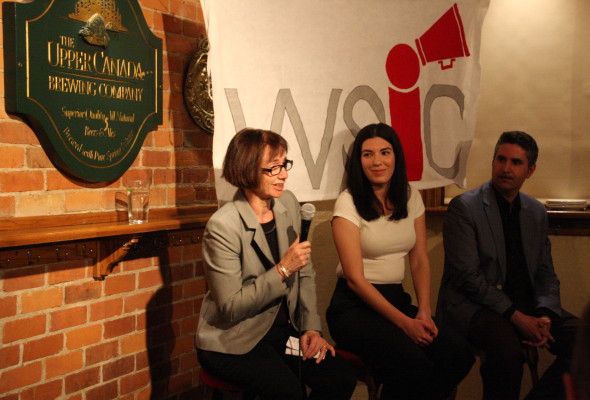May 16, 2016
Deirdre Leowinata
The new Liberal leadership has a lot of people talking. And it’s not just about our beautiful new Prime Minister, but what he’s doing to do about a little green leaf. Mary Jane, ganja, reefer, weed. It has many names but to the law it has always been one thing: Illegal. At least since 1923 during an apparent “opiate” wipe by the government, when it was criminalized without any studies or debate. The decriminalization of marijuana has already changed things, and in anticipation of legalization the market is already starting to change. These days, dispensaries are already almost as common as coffee shops, especially in the downtown areas of Queen West and Kensington market. Currently, as an unregulated substance, the marijuana market in Ontario has become a bit of a Wild Wild West for new businesses, peppered by the occasional police crackdown while the government figures out the best way to control the popular substance. On May 16th, we talked about the significance of weed to Toronto when the dust finally settles.
Joining us at the Madison were three panelists with vested interests in the marijuana industry. Alison Smiley is president of Human Factors North, a human factors engineering consulting company, and works a lot in the effects of substances on driving and accident rates. Shega A’mula is the communications director at Tweed Marijuana, a licensed Canadian marijuana producer. And Paul Lewin is a marijuana-related litigator famous for the R. vs. Mernagh case that played a crucial role in Canada’s medical marijuana laws. They all came with different perspectives, and the audience picked their brains for an idea of what will happen in a marijuana society.
The truth is, of course, that we have been a marijuana-using society for a long time now. In fact, the situation bears resemblance to the time of prohibition in more ways than one. At the time of legalization, people actually had to have alcohol prescriptions. For what medical ailment it treated, don’t ask me. But also like alcohol, marijuana does likely increase vehicle crash risk after consumption due to slower response times —but does it do so more than alcohol? Under criminalization, we had no way of studying the actual effects of the substance because of the lack of information we had. To test marijuana presence in the body, scientists need blood samples, which are difficult to obtain from voluntary subjects, with it being illegal and all. So one way marijuana regulation is really going to help is in determining dose-response curves and reasonable limits for people of all ages. As of right now, we know virtually nothing. Hopefully legalization will also help increase public knowledge about the facts of marijuana, like the fact that it is very hard to get a second-hand high. Legalization will undoubtedly unleash a whole new research sector onto Ontario’s scientists. Perhaps this is an opportunity to turn our drug dealers into highly successful chemists!
What is going to have to be regulated?
As with all new things, there are a lot of things that we don’t know about what is going to have to happen to make the marijuana business run smoothly. As mentioned above, we don’t have a way to test for it without taking a blood sample. The strains of course, and the substances in them, will definitely need to be regulated. Perhaps public use as well—but maybe it can just follow cigarettes? We also don’t have any regulations for medical users who drive, though there are apparently strains that give the medical benefit but are not psychoactive. And what about home-growers—Lewin mentions talk of regulated home growing, but it might start with just licensed producers. Do dispensaries have a place in that market? He also thinks that because it has been such a regular drug in the public realm, we don’t have to regulated it to death. Does that mean we’ll have to rely on…our own common sense?!
Who is going to regulate it?
As of right now, there is a six-person task force working on regulations. There are members from health, justice, and legal sectors, but the funny thing is that there is not a single person from the cannabis sectors, which is as Lewin remarked “like regulating mountain climbing with no climbers”. Hopefully that changes, and provides even more job opportunities for your dealer.
Speaking of Which…What will happen to drug dealers?
A’mula has high hopes for the friendly neighbourhood dealer—she thinks that if they’re passionate about the drug, they’ll continue to work in the field as part of an authorized company. Sure, they might be working for “the man”, but at least there will be a much lower chance of a prison sentence. And Lewin even believes that there might be a place for dealers in a regulated market, and they might even play a part in keeping the market accessible. Because if prices are too high, “the guy on the corner is going to keep on selling”, which is apparently why weed in Uruguay is so darn cheap. The government didn’t want to support organized crime, so they refined the system and sold for $1/g. Colorado, in contrast, has a strong black market largely due to sky-high taxes on marijuana. In the end, staying away from the LCBO-style monopoly is in the best interests of all.
There are still many unanswered questions about what will happen when this substance gets legalized. Like alcohol, the panel agreed that social norms will have to be the drivers for a lot of habits. Like alcohol, there will be users, there will be abusers, but overall it will be safer – and hopefully as accessible, if not more accessible, than it is now. As A’mula says, we are leaders in this field and this world, and what we do might have big consequences.







